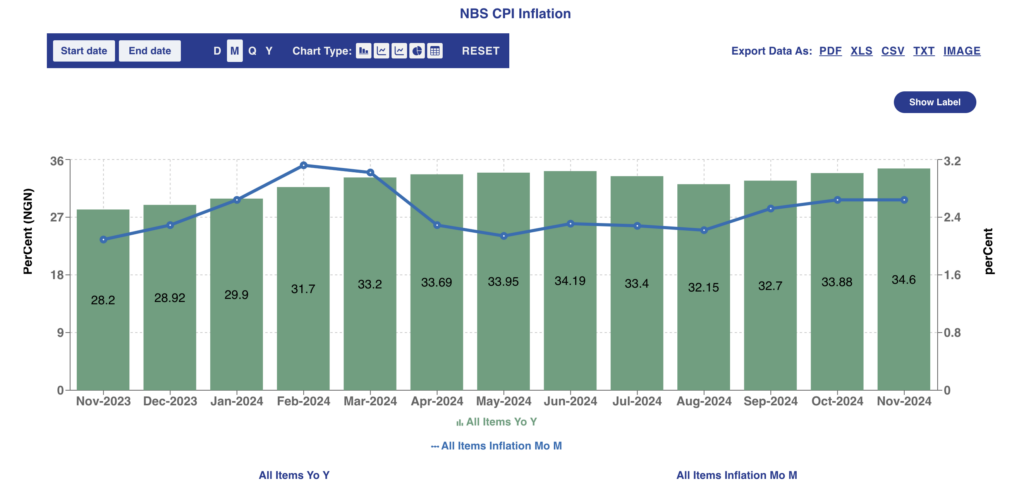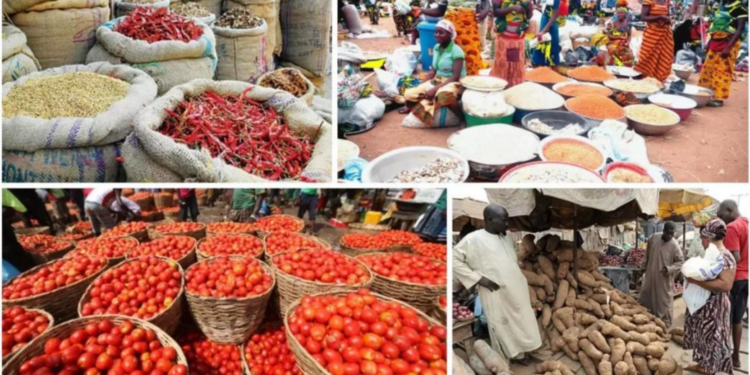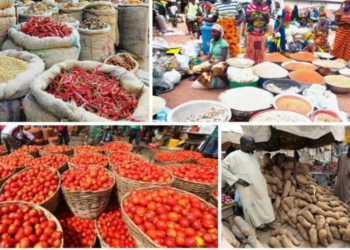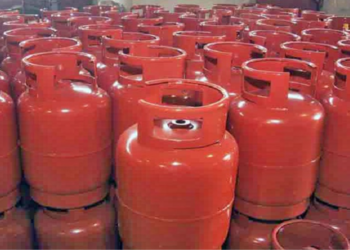Nigeria’s headline inflation rose to 34.60% in November 2024 reflecting a further surge in the costs of goods and services across the country.
This is according to the latest Consumer Price Index (CPI) data released by the Nigeria Bureau of Statistics (NBS). This shows that the headline inflation rose 0.72% from 33.88% in October.
The last time Nigeria’s inflation rate was this high was 28 years ago in March 1996 when it rose to 41.9%.
Nigeria has been experiencing galloping inflation throughout 2024 rising from 28.9% at the end of 2023 to 34.6%.
This is despite several efforts by the central bank to combat inflation, especially via its hawkish monetary policy that has seen its benchmark rate rise from 18.75% at the end of 2023 to 27.5% this year
November Inflation
According to the NBS, Nigeria recorded an inflation rate of 34.6% the highest so far in 2024 as Nigerians faced higher fuel and food prices.
- On a month-on-month basis, the inflation rate rose by 2.638% when compared to the 2.640% recorded in October 2024.
- The pace of monthly inflation has remained under 3% after rising by 3% and 3.1% back to back in February and March of last year.
- Among the major drivers of inflation this year are food inflation, imported food inflation, and alcoholic beverage inflation which all rose significantly in the month under review.
All sub-indexes experienced rising inflation except for Health, Communication, recreation, and culture which all experienced decline year on year.

Source: Nairalytics
Urban and Rural Inflation
The Urban inflation rate on a year-on-year basis was 37.10% in November, marking a 6.88% rise from the previous year. Urban inflation increased by 0.02% to 2.77% on a month-on-month basis.
- Rural inflation had a year-on-year inflation rate of 32.27% in November 2024, representing a 5.84% increase from November 2023.
- However, on a month-on-month basis, rural inflation decreased by 0.02% to 2.51%.
- The twelve-month average inflation rates for urban and rural areas stood at 35.07% and 30.71%, respectively.
- These figures indicate a significant rise in inflation rates compared to the previous year.
Food Inflation
The Food inflation rate in November 2024 rose by 7.08% to 39.93% from 32.84% in November 2023, on a year-on-year basis.
The year-on-year rise in Food inflation was caused by increases in the prices of various food items such as Yam, potatoes, Maize Grains, Rice, Palm Oil, and Vegetable Oil, among others.
- On a month-on-month basis, the Food inflation rate in November 2024 was 2.98%, increasing by 0.05% points compared to the 2.94% recorded in October 2024.
- The month-on-month rise is attributed to the increase in the average prices of various classes of food, including fish, meat, bread and cereals, and grains.
- The average annual rate of Food inflation for the twelve months ending November 2024 over the previous twelve-month average was 38.67%, which was 11.58% points higher compared with the average annual rate of change recorded in November 2023 (27.09%).
- In November 2024, Sokoto, Yobe, and Edo states experienced the highest year-on-year food inflation rates, at 51.30%, 49.69%, and 47.77%, respectively.
- In contrast, Kwara, Kogi, and Rivers states recorded the lowest year-on-year food inflation rates, at 31.39%, 32.95%, and 33.27%, respectively.
On a month-on-month basis, Yobe, Kano, and Kebbi states saw the highest food inflation rates in November 2024, at 6.52%, 5.95%, and 5.68%, respectively.
Meanwhile, Borno, Adamawa, and Kogi states experienced the slowest month-on-month food inflation rates, at 0.76%, 0.90%, and 1.21%, respectively.
Core inflation
The core inflation, which excludes the prices of volatile agricultural produce and energy stood at 28.75% in November 2024 on a year-on-year basis, rising by 6.36% from 22.38% recorded in November 2023.
- NBS noted that the highest increases were recorded in prices of transportation, accommodation, and services.
- However, the Core Inflation rate on a month-on-month basis dropped by 0.3% from 2.14% in October 2024 to 1.83% in November 2024.
- The average twelve-month annual inflation rate was 26.64% for the twelve months ending November 2024, this was 6.29% points higher than the 20.35% recorded in November 2023.
Note: A previous version of this article indicated that this was the highest inflation in 26 years. This has now been corrected to 28 years.























